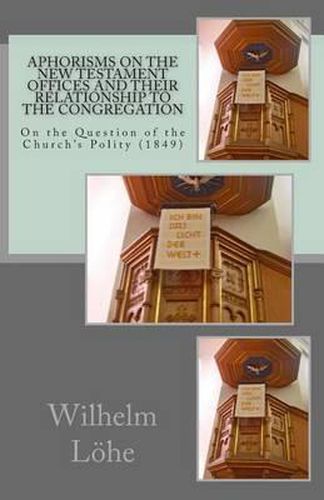Readings Newsletter
Become a Readings Member to make your shopping experience even easier.
Sign in or sign up for free!
You’re not far away from qualifying for FREE standard shipping within Australia
You’ve qualified for FREE standard shipping within Australia
The cart is loading…






Johann Konrad Wilhelm Loehe (1808-1872) was one of the pivotal nineteenth century theologians in the struggle to restore a confessional identity to the Lutheran churches of Europe and North America. In an age when the doctrine of the ministry was contended on both sides of the Atlantic, Loehe found himself in a protracted struggle with theologians of the State Churches of Europe and various synods in North America over the nature and work of the pastoral office. As the translator for the 1849 Aphorisms notes in his preface: Both sets of Aphorisms are not to be seen in isolation, but rather in intimate connection with the churchly program that Loehe developed with great energy (yet without detriment to his parish duties) in the years when he was most crippled with devastating grief over his wife’s early death. The political crisis of 1848 awoke unfounded hopes in Loehe’s breast that his churchly program might in fact be realised sooner rather than later. In the end of the day, perhaps only half of Loehe’s aspirations turned into hard fact, namely, the establishment of the order of deaconesses and the erection of the caritative institutions bound up with the procession of diakonia from the altar. To this day much of Lutheranism in the old world remains under the shackles of the State control that Loehe lamented in the shape of the supreme episcopate of the princes. Moreover, his hopes of a renewed Lutheranism, centred in the sacrament of the altar, gladly and unforcedly practicing unmixed eucharistic fellowship (his term for our closed communion ), and moving toward a greater fullness of liturgy, polity, and life than was achieved in the 16th century, have been sadly disappointed. Both sets of Aphorisms emerge from this context of conflict and expectation. With one foot in both Lutheran Orthodoxy and Lutheran Pietism (he would not see these successive ecclesial phenomena as alternatives), Loehe reached back behind these powerful factors in his formation to the New Testament text, his prime motivation being loyalty to revealed truth. From the communion of saints he surely bids us test his assertions against the yardstick of the inspired text.
$9.00 standard shipping within Australia
FREE standard shipping within Australia for orders over $100.00
Express & International shipping calculated at checkout
Johann Konrad Wilhelm Loehe (1808-1872) was one of the pivotal nineteenth century theologians in the struggle to restore a confessional identity to the Lutheran churches of Europe and North America. In an age when the doctrine of the ministry was contended on both sides of the Atlantic, Loehe found himself in a protracted struggle with theologians of the State Churches of Europe and various synods in North America over the nature and work of the pastoral office. As the translator for the 1849 Aphorisms notes in his preface: Both sets of Aphorisms are not to be seen in isolation, but rather in intimate connection with the churchly program that Loehe developed with great energy (yet without detriment to his parish duties) in the years when he was most crippled with devastating grief over his wife’s early death. The political crisis of 1848 awoke unfounded hopes in Loehe’s breast that his churchly program might in fact be realised sooner rather than later. In the end of the day, perhaps only half of Loehe’s aspirations turned into hard fact, namely, the establishment of the order of deaconesses and the erection of the caritative institutions bound up with the procession of diakonia from the altar. To this day much of Lutheranism in the old world remains under the shackles of the State control that Loehe lamented in the shape of the supreme episcopate of the princes. Moreover, his hopes of a renewed Lutheranism, centred in the sacrament of the altar, gladly and unforcedly practicing unmixed eucharistic fellowship (his term for our closed communion ), and moving toward a greater fullness of liturgy, polity, and life than was achieved in the 16th century, have been sadly disappointed. Both sets of Aphorisms emerge from this context of conflict and expectation. With one foot in both Lutheran Orthodoxy and Lutheran Pietism (he would not see these successive ecclesial phenomena as alternatives), Loehe reached back behind these powerful factors in his formation to the New Testament text, his prime motivation being loyalty to revealed truth. From the communion of saints he surely bids us test his assertions against the yardstick of the inspired text.